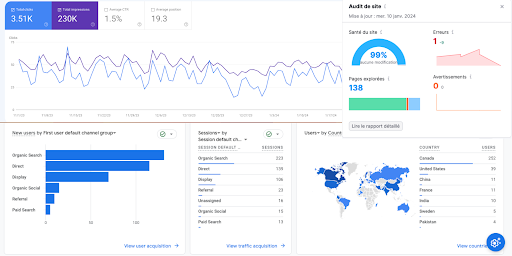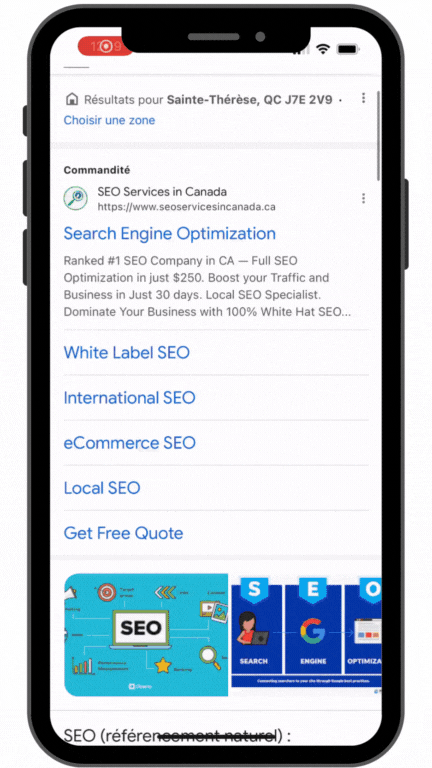Alex's tips: Organic search engine optimization (SEO)
Alex Ouimet
Digital performance and SEO
Organic Search Engine Optimization, also known as SEO, is arguably one of the least understood areas of the digital world. Its complexity stems from the fact that search engines set their own ranking rules, which they keep largely secret. Yet it's a fascinating and essential subject for any company wishing to stand out on the web.
Whether you opt to manage your SEO in-house or prefer to outsource the task to experts, it's important to note that every month I implement a methodology aimed at making SEO more accessible through a continuous and efficient process. In this blog, I'll be sharing my tips and recommendations for building a solid SEO strategy.
Having the right tools and resources
Having the right resources and the right tools are essential when implementing an SEO strategy, whether it's to assess the current situation, establish opportunities or continuously monitor the impact of the strategies you've put in place. Before taking the plunge, you need to make sure you have the right resources, be they human, material or budgetary. These resources can be expensive, and that's where choosing an agency can become a wise choice. Here's an overview of the tools I use that are indispensable.
Google Search Console
You can use Google Search Console to monitor your online performance, including clicks, impressions, click-through rate and average position. You can also check the indexing of your pages and identify any technical improvements required.
Google Analytics (GA4)
Google Analytics is essential for measuring SEO performance. This tool provides you with accurate data on traffic, conversions, and much more, enabling you to make informed decisions to improve your website's visibility.
SEMrush
SEMrush is the essential tool for evaluating and optimizing SEO performance. This suite of online tools is extremely powerful, offering you a range of features such as website performance monitoring, competitor analysis, keyword research, backlink evaluation and search engine ranking tracking. Personally, I love this tool for its ability to provide essential data to improve the visibility and performance of an online website.
Determining objectives and the right KPIs
Many people think that SEO is simply about attracting more visitors to a website. However, the objectives vary from company to company, whether you're a large multinational or a small local bakery. To succeed, you need to define precise and realistic objectives. Use the SMART method: objectives that are specific, measurable, achievable, realistic and time-bound! Here are a few examples of objectives relevant to an SEO strategy that I use in real-life cases.
Increase the number of keywords for which the site appears in the first three search results.
Improve site ranking on Google for strategic keywords.
Increase organic traffic to the site.
Increase the conversion rate of visitors coming from SEO, reflecting the quality of the traffic generated.
Improve the site's overall sales performance.
It's also important to choose the key performance indicators (KPIs) that will help you measure your results. Here are a few examples of SEO-relevant KPIs I use on a regular basis.
Organic conversions (sales, leads)
Organic visibility (impressions)
Organic session on the site
Organic click-through rate
User engagement (number of pages, engagement time)
Branded and unbranded traffic
Ranking and tracking keywords
Google company profile indicators
Backlinks
👉Did you know? Recently, there is no longer a page on Google. It's now an infinite feed, inspired by social networks!
SEO leverage and action plan
Now that we've set up our tools, carried out an audit to assess the situation, formulated our objectives and established the KPIs to measure our actions, it's time to implement the strategy. There are often more than one possible strategy and action plan, but for my part, I work my strategies according to 4 main levers. I'll share these levers with you and explain how they can help us achieve our objectives.
SEO techniques
One of the considerations of the Google algorithm is the technical performance of the site. For example, a site with content that takes a long time to load, or one that isn't optimized for mobile, can have an impact on web page indexing. That's why, every month, I carry out a technical audit of the site and set about correcting these errors.
Content creation and optimization
According to Google and specialists in the field, the new cornerstone of SEO is the creation of quality content for users, whether written by a human or AI. It's no longer a question of filling pages with keywords, the idea is to offer content that answers the questions and problems of the target audience. Every month, I create a blog, a new page and optimize an existing page to improve its ranking. I suggest you keep an eye on the "People also ask" section to see what's trending and get inspired.
Backlink - Netlinking
Netlinking refers to the creation of inbound links or backlinks pointing to a website from other external sites. This practice is important in SEO to improve a website's visibility in search engines. However, you need to be careful about the quality of inbound and outbound links, as sites with a poor quality score can be detrimental to your objectives.
Local SEO
Local SEO is important for everyone, but even more so for businesses with a street presence or service companies operating in a specific territory. It's important to have a Google business profile, optimize it and maintain it by updating the information regularly. It's also possible to use other levers, focusing more on a specific region. Positive reviews are an indispensable key!
Stay up to date on SEO trends
Even if we have an effective strategy, we still need to stay up to date and follow trends. In 2023 alone, Google made more than ten updates to its SEO algorithm, affecting different aspects such as reviews, Web Core and the fight against spam, to name but a few. This makes it difficult to keep up with new trends and ever-changing rules.
Personally, here's how I do it: I subscribe to newsletters from SEO experts, I follow specialists on social networks, like X (formerly Twitter), and I also consult Google content directly. Here are my favorite sources for staying on top of SEO:
Newsletter and blog
Social networks (X, Twitter)
Barry Schwartz
Frederick Vallaeys
Google Search Central
And more!
Google
Podcast: Search Off the Record
Good luck in the world of SEO, and if you ever need help, we're here for you! See how we can help you.



